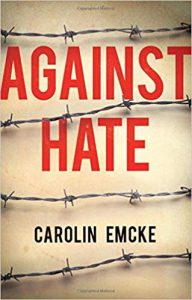
![]()
‘As a homosexual and an intellectual, I belong to two … social groups that are particularly hated’ says Carolin Emcke, in her book Against Hatred. Originally published in 2016 in her native Germany, this recent English translation reads like an academic presentation, or PhD paper. That’s a pity.
Quoting people like Hannah Arendt and Jacques Derrida might go down well in certain intellectual/academic circles – folk like that were bread and butter for the staff/syllabus at Goldsmiths when I was there – but almost certainly won’t reach beyond people who, like me, largely share Emcke’s ideals already. So she’s really preaching to the converted.
Even though his books tend to be enormous and time consuming, I prefer Stephen Pinker’s approach, which is closer to the Dawkins/Dennett axis of scientific methodology. As a result Pinker’s perhaps/probably more likely to reach a wider audience, his reference points being less left-wing-Euro-cultural, i.e. more Charles Darwin than Jean Paul Sartre.

The back cover blurb mentions such things as passion, lucidity, brevity and precision. Well, I’m afraid it was only really the passion I could find. The text varies from occasionally straightforward to sometimes headache-inducingly convoluted (most especially so when quoting postmodernist thinkers), which does the very valid and timely underlying arguments no favours.
Emcke wants a pluralist, democratic, secular society. So do I. But not everybody else does, clearly! And it’s these people, and the ‘mechanisms’ that give rise to their feelings and actions that she’s ostensibly scrutinising and discussing. Brexit and Trump happened just after she first published the book, and are mentioned in the book’s Postscript as worrying symptoms of collective atavistic regression. Again, agreed.

But, and here there’s a strange irony, if any lessons from history both confirm and yet contradict Emcke’s hopes, beliefs and desires, it’s Nazi Germany. On the one hand Nazism (and similar irruptions around the world) proves that über-hatred carries within it the seeds of its own destruction. But on the other we had to fight fire with fire. It was the Hawks of the East and West who defeated Hitler, not the academic/intellectual Doves, who all too often wound up in jail, gulags or the gas chamber.
During WWII there came a point when lines were crossed by all parties, haters and the hated, even the bystanders, and – even though we can argue that the progressive powers of democracy (well, that holds to some degree for the Western powers, but certainly not Stalin’s Russia!) beat the retrogressive powers of fascism – pluralism failed to cope with or contain less tolerant ideologies.
It’s a tough subject, and whilst I agree with much of what Emcke says, the content, I was disappointed by the delivery, or form. I wouldn’t recommend this, to be honest. Instead set aside a bit more time and read Pinker’s Better Angels.
